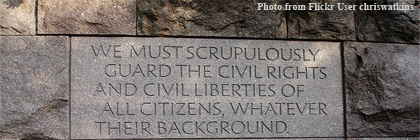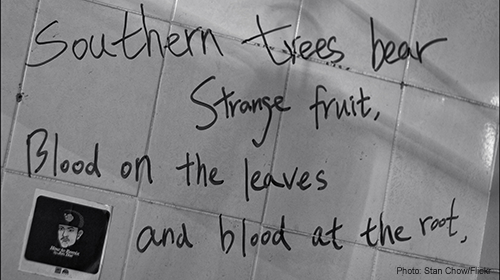We’re wrapping up two committee weeks at the Capitol that saw a lot of action around civil rights and civil liberties. The legislature will now break for a week and come back to start the formal session on March 2. Here’s what you need to know to get prepared.
I’ve written about how body cameras are a great oversight mechanism that reduces the use of force incident and citizen complaints alike. We’ve sent suggestions to local and state policy makers alike suggesting some smart ways to protect privacy without frustrating the oversight purpose of the cameras. The Senate, however, has taken the promise of body cameras and turned it on its head by pursuing broad exemptions from the public record laws for the resulting footage.
Just as body cameras are getting off the ground in Florida, SB 248 will ensure that in many situations, the footage will never see the light of day. Of course, this bill reserves the right for law enforcement to film whatever and whenever they want and then release the footage when it serves their purposes. But we, as the public, will no longer have the right to request public release of these videos even when there are serious allegations of abuse or misconduct. We’re now opposing this bill and hope you will join us as its original objective to be an oversight mechanism no longer exists.
I also testified before the House Civil Justice Subcommittee about the need to protect people’s privacy even after they pass away. The legislature is considering a bill that would attempt to revoke your digital privacy after you die. Right now federal law protects the contents of your digital communications and if you don’t make other arrangements, your email, social media, dating profile, blog and other passwords will not be shared after you go. This bill, HB 313 in the House and SB 102 in the Senate, would allow whoever administers your estate to have broad access to all your accounts.
Estate lawyers insist this is necessary to settle a person’s estate after they die, but they’ve yet to provide a single example of how they’ve been unable to find and distribute anyone’s assets without this sweeping authority. They propose you hire them to write a will that would explicitly address these concerns if you want; but if you’re among the 65% of Americans who don’t have a will at any given time, you’re out of luck. We’re working with tech giants like Google, Facebook and AOL to fight this bill which has been rejected by every other state, except for one, that has considered a similar bill.
We’re also preparing to fight against a new bill by Senator Flores that would impose a 24-hour waiting period on women seeking abortions. It hasn’t been scheduled for a vote yet but we’re keeping an eye on it and will be asking you to contact your Senator about this bill next month.
This is going to be a busy legislative session, and we’re looking forward to working with you to protect civil rights and liberties in Florida.

